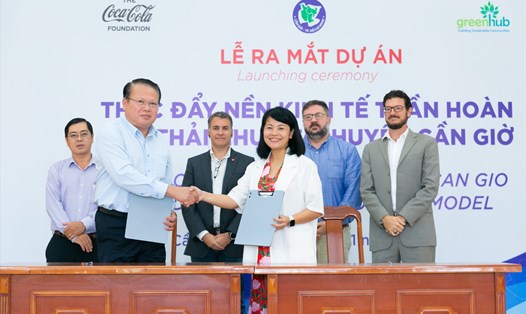Circular economy is becoming an inevitable trend in the development process of many countries, Vietnam is no exception to that trend.
Instead of the traditional model of " exploitation - production - consumption - discharge", the circular economy focuses on reusing resources, extending product life cycle and minimizing waste released into the environment. This is considered the key to helping Vietnam develop sustainably, both meeting growth requirements, protecting the environment and improving national competitiveness.
At the forum " Implementing a circular economy in Vietnam: Policy and connecting actions" held on November 10, Prof. Dr. Le Van Loi - Chairman of the Vietnam Academy of Social Sciences said that the circular economy is not only a trendy concept but a new development architecture of Vietnam in dual transformation - digital transformation, green transformation.

"This is an inevitable path for us to reduce dependence on resources, reduce emissions, improve energy and material efficiency, and at the same time open up new sustainable markets, jobs and value chains. Decision No. 222/QD-TTg dated January 23, 2025 of the Prime Minister approving the National Action Plan to implement the circular economy until 2035 is a strategic step to concretize the goals in the Law on Environmental Protection 2020, Green Growth Strategy and National Strategy on Climate Change" - Prof. Dr. Le Van Loi affirmed.
According to Associate Professor, Dr. Bui Quang Tuan - Vice President of the Vietnam Economic Science Association, former Director of the Vietnam Institute of Economics, the circular economy is an important pillar of the new growth model, helping Vietnam both improve productivity and develop sustainably.
Circular economy is understood as a model in which all outputs can become input of other processes, aiming to reduce waste, reuse and recycle resources, forming "circular cycles" in production and consumption. From the traditional 3R principle (Reduce - Reuse - Recycle), the circular economy has now transformed into 10R, including repair, recovery, reproduction, reuse or refusal to use products that are harmful to the environment.
"The goal of the circular economy is to extend the product life cycle, reduce emissions and promote innovation in design, technology, and business models" - Mr. Tuan emphasized.
According to him, the circular economy not only brings environmental efficiency but also creates new economic momentum, helping businesses save input costs, increase competitiveness and participate more deeply in the global value chain.
"When combined with digital transformation, the circular economy will form a green innovation ecosystem, where data, technology and resources are continuously regenerated, creating a foundation for in-depth growth. In particular, the circular economy plays a very important role in the economy, in double-digit growth" - Associate Professor, Dr. Bui Quang Tuan affirmed.
In the urban field, Dr. Nguyen Thi Hanh Tien, Faculty of Biotechnology, Chemistry and Environmental Engineering (Venikaa University) said that every day, Vietnam's urban area generates more than 8,000 tons of solid waste, mostly from households. Currently, 70% of the garbage is still buried, many landfills are unsanitary, causing environmental pollution and greenhouse gas emissions.
According to Dr. Nguyen Thi Hanh Tien, the inevitable direction is to shift from the "collection - treatment" model to "reducing - recycling - reusing" according to the circular economy. Waste needs to be considered a secondary resource, which can be classified, recycled and returned to the production cycle.
"People are the center of the circulation process. The community, government and businesses need to coordinate synchronously in improving collection - recycling infrastructure, innovating technology and changing consumer behavior. When there is inter-sectoral and inter- benal participation, urban waste management in the direction of a circular economy will truly become a sustainable reality" - Dr. Tien affirmed.


